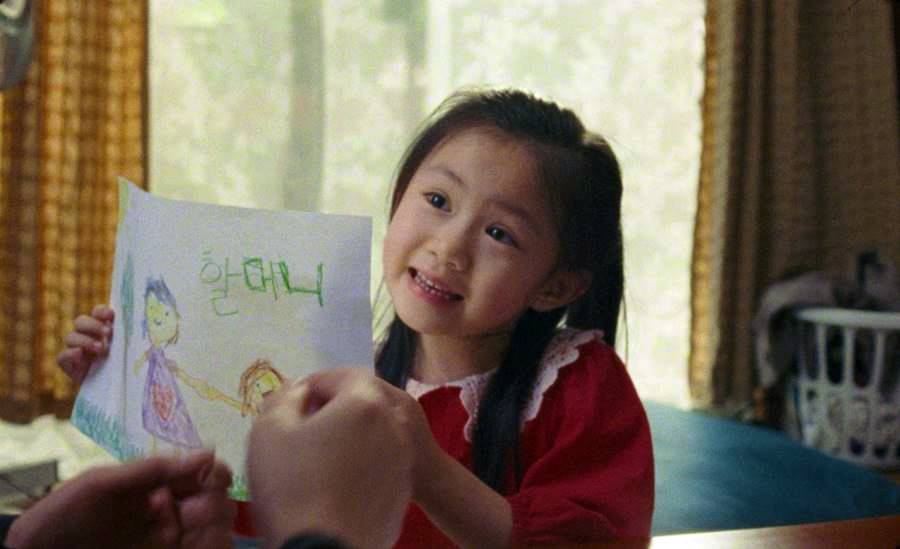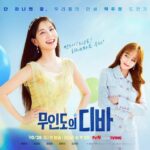
By Jae-Ha Kim
Substack
May 5, 2023
A couple days ago, I shared a 1½ minute movie called “Halmeoni” — which means grandmother in Korean — by filmmaker Kevin Jin Kwan Kim. It is one of the most beautiful and touching things I’ve seen in a long time. It’s a piece of art that is especially relevant to immigrants who have lost their first language.
May is Asian/Pacific American Heritage Month. So for my first Substack of May, I wanted to address the loss of language that many of us went through when our families immigrated.
But, first, please indulge me while I go off on a slight tangent. When our son was a baby, our goal was to raise him to be bilingual. I tried speaking to him in Korean as much as I could. But here’s the thing: it’s difficult to raise a bilingual child when English has been my dominant language since I was very young. I was sad — but not completely surprised — when my then toddler stopped calling me umma (which means mommy) and referred to me as mom instead. After all, that’s what all his friends called their mothers. And that’s what all the kids on his favorite shows called their TV moms, too.
When I emigrated from Seoul to Chicago with my family, I wasn’t much older than a toddler. When my siblings were enrolled in school in the U.S., they excelled at math — which was taught at a much lower level than they had been used to in Korea — but they barely spoke any English. They stayed up late in the night studying with our father, who had been a military interpreter back in Korea. But within a year, they were completely caught up and bilingual. My brother was even double promoted.
As for me? I had it easy. Back then, kindergarten wasn’t like it is today. We had lots of play time, ate snacks, took naps, and listened as our teacher read books to us. In retrospect, it was the best of times. We had very little stress.
Well, there was the little white boy who tried to “trade” me when the boys had to pick girls as their partners for some activity. No one wanted to be stuck with the little Asian kid. Anyhow… Hi, Daniel! Did you regain your hearing after your dog bit your ear off?
Back then, we didn’t do any homework in kindergarten — something my child had to do when he went to preschool, for Pete’s sake. Just by being immersed with other kids my age, I quickly became fluent in English without the pressure of grades. The following year in first grade, I was well established as the top student for my age group. Whenever there were any honors to be given, the kids would make room for me to pass by because they knew I’d be winning them.
But by then, I’d already started to lose my Korean.
In that era, the teachers encouraged immigrants to only speak English at home so that we wouldn’t fall behind. But what they didn’t know at the time — or perhaps they didn’t really care about — was that in the rush to make us understand English, many of us lost our ability to converse in our birth language.
My brother always points out that it’s a miracle that I speak Korean as well as I do today. (And FWIW, my flat Chicago accent gives away that I’m no longer a Korean native.)
I wish I spoke better Korean and I regret that I didn’t pay more attention when my parents enrolled me in weekend Korean school. I was about 11 or 12 years old when my parents realized they had to do something or I would lose my ability to speak any Korean at all. But all the children my age were in advanced Korean classes reading literature and writing essays, which I was incapable of. So I was put in the baby class where all of my classmates literally were kindergarteners.
At first, my classmates thought I was the teacher because I was so tall (compared to them) and they bowed to me to show respect. Then after the teacher explained that I was a student — just like them — a couple of the 5-year-old Mean Girls made fun of me in Korean … which I understood! Yay?
So much for respect. I didn’t feel guilty when I beat those little girls up after school.
No, I’m just kidding about that last part. I did feel guilty.
JUST KIDDING! I did not pick a fight with any of my tiny (and cute) classmates.
But the end result was that I refused to go back to Korean school after that year was over.
Had I not been in a class with children who were half my age… had my elementary school teachers not encouraged my parents to speak to us only in English… had anyone in power realized back then that you don’t become assimilated by losing part of your culture… had there been the knowledge that losing your Korean language doesn’t make you any more of an American… I think I would’ve been more whole, if that makes sense. Because I’ve spent a good chunk of my adult life re-learning the Korean language and, in the process, appreciating the culture I was born into.
The language barrier between my parents and me wasn’t as strong as depicted in the short film above. We could always communicate, with a lot of Konglish on my part. For that, I’m grateful. But I do wish my parents had corrected my grammar instead of thinking my malapropisms were cute. Sure, mistaking 빗자루 (broom) for my favorite veggie dish 고사리 (bracken) was adorable when I was 6. But … I continued to say it in my teens because no one told me otherwise.
Of course, my experience isn’t the same for all immigrants. There are plenty of people who never had to relearn a language, because they never forgot it. And I am low-key envious of them.
Being fluent in a second language often is something you don’t really appreciate, until you’ve lost the ability to speak it.






I’m Lakota, but my first language is English, and ironically I became an English instructor at the tribal college where I had received my degree and where- even more ironically- the chief purpose was to reclaim the Lakota language and culture. I grew up hearing Lakota in my home and understanding it, but I can only speak a few phrases. The language continues to fade every year no matter how many language grants we get and language curriculums we develop. I possibly can understand about as much Korean as Lakota at this point, after three years of being obsessed with Kdramas and BTS.
Like the story. There’s a novel in there waiting to come out!
As someone who is trying to “reclaim” Mandarin, this post resonated so much with me. I grew up speaking English, even though my Chinese grandmother wanted us to at least learn some Mandarin or Hokkien alongside Filipino. But by the time my parents realised that they should have let us learn the language, it was a little too late. Filipino was a little easier to learn because we’re surrounded by it in the form of school subjects and friends. But Mandarin is a different story, so it’s now in my goal to learn the language for myself—to become fluent in reading, writing, and speaking, as a way of learning more about that part of my heritage that I lost while growing up. (Also, what a beautiful video. Thank you for sharing!)
Thank you for writing this, Jae-Ha. I don’t have children yet, but I have very similar thoughts about how my partner and I might raise them if we have any. My grandma Amma watched me for some time when I was preschool age and taught me some of my mother tongue Hokkien (which shares a lot of words with Korean) just like in the short film you shared. We did use it at home in Socal, but Amma went back home and my parents both worked so it gradually faded from my memory as I grew up, especially once I moved away to college on the East Coast. Toward my late 20s whenever I’d visit home she’d ask when I was going to get married. Fast forward to when I’m 30: Amma was diagnosed with advanced pancreatic cancer and I managed to visit CA a couple times over the course of her treatment. Like the woman in the short, I could barely string sentences together, but I held her hand and tried to let her know I was there and that I loved her. After a long and difficult fight, her health deteriorated more quickly than I could manage to make it out to CA. Amma didn’t get to see me get married, but at 40 I’m planning my wedding now. Next year as I walk down the aisle I’ll be thinking of her and hope somewhere she’ll know I’ll be happily married. ❤
That part about NOT beating up those girls gave me a good chuckle! But on the language side, my grandparents (Mexican/Maya heritage) and all their children are fluent in Spanish but growing up my mom basically refused to teach us. When I was younger and living with my grandparents I used to be able novelas and understand even if my speaking skills were spotty. But I lost most of that after moving away from that almost total immersion and now here I am in my 40’s still learning Spanish. I told my mom I’ll never forgive her for my suffering lol.
Wow , I finally understand why my father raised me the way he did. . . I have always lived in a multicultural community and growing up my father always said figure it out or learn their language but I never want too hear you say speak English you live in America. See Im mixed Native American Potawatomi fathers side and white mothers side and my dads mom, Grandma, would always say with her hand on your heart listen with your heart and no language will be a barrier and to this day Im always asked how you know what was said I say I don’t but I trust my heart too guide me , I don’t always get it right but its enough that they in their Native tongue will show me sometimes with a smack on the head and a few curse words we figure out what each of us are saying then the laughing starts and the cooking begins . . . Love what ya do and thanks for my aha! momet. Hugs 🤗